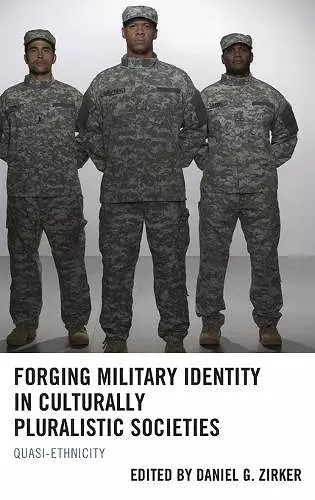Forging Military Identity in Culturally Pluralistic Societies
Quasi-Ethnicity
Daniel Zirker editor Thomas Stubbs editor
Format:Hardback
Publisher:Bloomsbury Publishing PLC
Published:8th Oct '15
Currently unavailable, and unfortunately no date known when it will be back

Ethno-politics has become a major force in the post-Cold War era. The fundamental challenge to military establishments in deeply plural societies is the formation of institutional unity from diverse ethnic groups. This edited volume examines seven case studies of countries that have attempted, with varying degrees of success, to develop, or to begin to develop, within their military establishments a single “quasi-ethnic” military identity to effect unity within their ranks and attenuate the deep and often violent ethnic divisions that otherwise would pertain. The volume compares contrasting outcomes in two African regions: West Africa with the contrasting cases of Guinea and Nigeria and East Africa with the cases of Tanzania, Uganda and Kenya. It also examines the very different cases of Algeria and Suriname. In most of these cases, the emergence of a single, unified, quasi-ethnic identity is in its earliest stages, although rapid global change points to the likelihood that this pattern will prevail.
This timely and long-overdue compendium sheds light on the role of the military in ethnically divided societies. Going beyond professionalism and class, the study sees the military in divided societies as a quasi ethnic group ready to defend its interest and position in such settings. This is an important contribution to our understanding of political developments in ethnically pluralistic and frequently divided societies. -- Constantine Danopoulos, San Jose State University
Civil-Military Relations in post-colonial, post-Cold War, Africa remains understudied, making Daniel G. Zirker’s Forging Military Identity in Culturally Pluralistic Societies: Quasi-Ethnicity a great contribution to this endeavor. By accentuating the challenge African militaries face in maintaining institutional autonomy amidst ethno-political and other socio-cultural rifts afflicting African societies, this book vindicates Morris Janowitz’s argument while also unravelling Africa-specific experiences that puzzlingly defy theoretical expectations–whether from an institutional, structural, or identity perspective–as variations within plural East Africa reveal. The book is highly recommended for policymakers, researchers, and students of African politics. -- Sabastiano Rwengabo, National University of Singapore
ISBN: 9781498507431
Dimensions: 236mm x 159mm x 16mm
Weight: 372g
154 pages